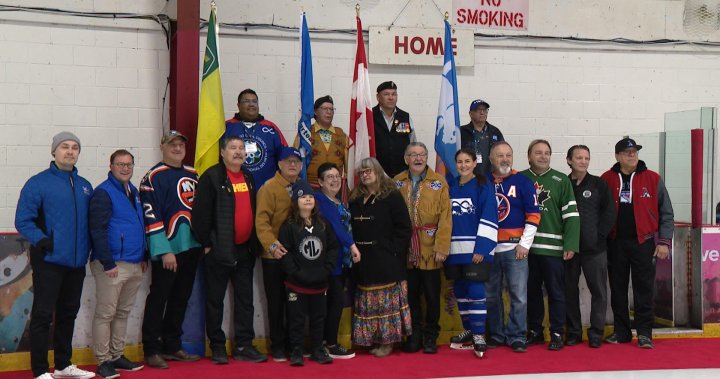The first annual Louis Riel Hockey Tournament and Floorball Festival took place at Saskatoon’s Rod Hamm and Harold Latrace arenas over the weekend. The event featured several men’s and women’s teams, both Indigenous and non-Indigenous, coming together to compete on the ice. Organized by Métis Nation Saskatchewan, the tournament focused on reconciliation and bringing communities together through the sport of hockey. President of the Métis National Council, Cassidy Caron, emphasized the importance of using hockey as a tool to bring people together, regardless of their backgrounds. She highlighted the positive impact that hockey can have on youth, stating that it has the ability to save lives.
Caron was pleased to see that the women’s division in the tournament was given equal status to the men’s, as this is not often the case in women’s hockey. She expressed her excitement about participating in the tournament herself, noting the strong competition and fierce competitiveness on display. Former NHL players Bryan Trottier and Rich Pilon also attended the event, speaking about the camaraderie that comes with playing hockey and the joy they experienced in seeing it at the tournament. Trottier mentioned that the Louis Riel Cup symbolizes inclusivity and the joy of sports, while Pilon emphasized the power of sports in bringing people together, including family, fans, and community members.
Métis Nation Saskatchewan president Glen McCallum emphasized the role of sports in uniting people and promoting reconciliation. He highlighted the divisiveness present in the country but saw the tournament as an opportunity to start a conversation about what Canada truly represents. McCallum praised the talent on display during the event, recognizing the beauty in bringing people together through sports. Overall, the event aimed to promote inclusivity, reconciliation, and unity among Indigenous and non-Indigenous communities through the shared experience of hockey.
The Louis Riel Hockey Tournament and Floorball Festival was a celebration of Indigenous culture, unity, and sportsmanship. By bringing together teams from diverse backgrounds to compete in the spirit of reconciliation, the event promoted a sense of community and togetherness. Participants and organizers alike emphasized the power of sports, particularly hockey, in transcending barriers and fostering connections between people. Through friendly competition and mutual respect, the tournament served as a platform for meaningful conversations about Canada’s identity and the importance of inclusivity.
The presence of former NHL players like Bryan Trottier and Rich Pilon added a touch of nostalgia and inspiration to the event, highlighting the universal appeal of hockey and the shared joy of playing the game. Their words of encouragement and support further reinforced the message of unity and camaraderie that permeated the tournament. The equal representation of men’s and women’s teams underscored the importance of gender equality in sports and the need to elevate women’s hockey to the same level as men’s. This commitment to inclusivity and diversity helped create a welcoming and inclusive environment for all participants.
Overall, the Louis Riel Hockey Tournament and Floorball Festival was a success in showcasing the positive impact of sports in bridging cultural divides and promoting reconciliation. Through the shared love of hockey, participants, spectators, and organizers came together to celebrate diversity, teamwork, and the spirit of competition. The event served as a reminder of the transformative power of sports in bringing people together and fostering understanding across different communities. As a symbol of unity and inclusivity, the tournament served as a catalyst for meaningful dialogue and cooperation among Indigenous and non-Indigenous Canadians.


